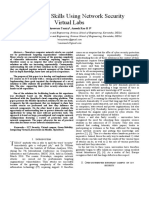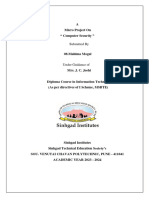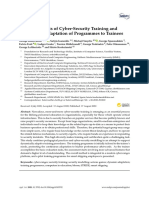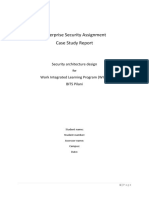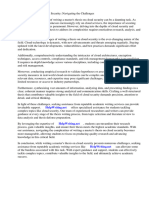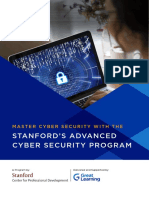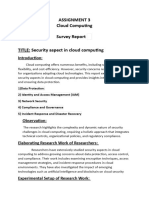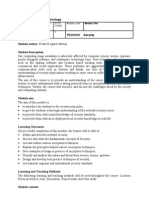0 ratings0% found this document useful (0 votes)
7 viewsInternship Presentation
Internship Presentation
Uploaded by
tarantrivedi31Project file
Copyright:
© All Rights Reserved
Available Formats
Download as PDF, TXT or read online from Scribd
Internship Presentation
Internship Presentation
Uploaded by
tarantrivedi310 ratings0% found this document useful (0 votes)
7 views11 pagesProject file
Copyright
© © All Rights Reserved
Available Formats
PDF, TXT or read online from Scribd
Share this document
Did you find this document useful?
Is this content inappropriate?
Project file
Copyright:
© All Rights Reserved
Available Formats
Download as PDF, TXT or read online from Scribd
Download as pdf or txt
0 ratings0% found this document useful (0 votes)
7 views11 pagesInternship Presentation
Internship Presentation
Uploaded by
tarantrivedi31Project file
Copyright:
© All Rights Reserved
Available Formats
Download as PDF, TXT or read online from Scribd
Download as pdf or txt
You are on page 1of 11
Presented By:- Anuraj (23SCSE2030685)
Branch:- MCA(SCAT)
Semester:-3rd
Year:-2nd
Reviewer:- Mr. Vinay Kumar Sharma (Assistant Professor)
ABSTRACT
This abstract outlines an online internship experience
with Palo Alto Cybersecurity, a leading firm in the
cybersecurity industry. The internship provided an
immersive opportunity to engage with cutting-edge
cybersecurity technologies and practices. Interns
participated in virtual collaborative projects, gaining
hands-on experience with threat analysis, vulnerability
assessments, and security protocol development. Key
responsibilities included analyzing network traffic,
simulating cyber-attacks, and contributing to real-time
threat intelligence reports. The experience emphasized
both technical skills and the strategic aspects of
cybersecurity, including risk management and incident
response. Interns also benefited from mentorship by
industry professionals, enhancing their understanding of
the cybersecurity landscape and preparing them for
future roles in the field. The program highlighted the
importance of adaptive problem-solving and continuous
learning in the rapidly evolving world of cybersecurity.
Introduction
This report details the experience and insights gained
from an internship at Palo Alto Networks, a leading
provider of cybersecurity solutions. The internship
program offered a comprehensive view into the
cybersecurity industry, emphasizing the practical
application of theoretical knowledge and exposure to
cutting-edge technologies in a real-world setting.
Company Overview
Palo Alto Networks is a global cybersecurity leader that
specializes in delivering advanced security solutions.
Founded in 2005, the company provides a broad range
of services including network security, cloud security,
and endpoint protection. Its flagship products include
the Next-Generation Firewall (NGFW) and various cloud-
based security services.
Internship Program Structure
The internship program at Palo Alto Networks is
designed to offer hands-on experience in cybersecurity.
It typically involves the following components:
Orientation and Training: Interns receive an introduction
to the company's culture, its security solutions, and an
overview of key cybersecurity concepts. Initial training
includes sessions on network security fundamentals,
threat analysis, and Palo Alto Networks' product suite.
Project Work: Interns are assigned to specific teams
where they work on real-world projects. These projects
may involve developing security features, conducting
vulnerability assessments, or working on threat
intelligence.
Mentorship and Networking: Each intern is paired with
a mentor who provides guidance and feedback. Interns
also have opportunities to network with professionals
across different departments.
Modules
1. Network Security Fundamentals
These courses cover network security fundamentals,
including connected devices, routing, area networks,
and protocols. They also introduce IP addressing,
subnetting, TCP/IP and OSI models, packet lifecycle, and
encapsulation. The courses teach endpoint security
prevention for threats like malware, viruses,
ransomware, and phishing attacks. They delve into
network security fundamentals for home networks and
critical infrastructure, and present Palo Alto Networks
network-security solutions.
2. Cybersecurity Fundamentals
This course offers a comprehensive
understanding of the modern cybersecurity
landscape and today’s cyberthreats. You’ll
learn about current attack methods, defense
strategies, public Wi-Fi risks, and protection
measures. You will also learn about modern
security models, focusing on perimeter-based
and Zero Trust models.
3.Cloud Security Fundamentals
These courses cover the core technologies used in cloud
computing, such as virtual machines and containers,
development operations teams, and the CI/CD pipeline.
They provide an overview of cloud computing models,
shared responsibility, best practices, and hybrid cloud
computing. The courses discuss the models and
processes organizations use for cloud technologies,
common software development models, and the
supporting teams. They explain how cloud-native
application protection platforms (CNAPP) offer
comprehensive protection with integrated security and
compliance capabilities for cloud-native applications in
development and production. Lastly, the courses
provide insights into how the Prisma Cloud platform
prevents and detects security risks using a cloud-native
application protection platform.
4. Operations Fundamentals
These courses cover the daily life of a SecOps analyst,
the six elements of security operations, and how SOAR
technology simplifies cybersecurity response and
prevention. They introduce endpoint protection with
the Cortex XDR agent, which combines behavioral
protection and AI-based analysis to stop advanced
attacks. The courses provide a high-level overview of
Cortex XSOAR Threat Intelligence Management (TIM), a
security solution for automating and streamlining threat
intelligence processes, including native threat
intelligence, data sources, incident enrichment, and
threat intel reports. Finally, the courses introduce the
products in the Palo Alto Networks Cortex platform:
Cortex XSOAR, Cortex XDR, Cortex XSOAR TIM, and
Cortex XSIAM.
Skills and Knowledge gained
Technical Proficiency: Improved skills in using
cybersecurity tools and technologies, such as firewalls,
intrusion detection systems (IDS), and security
information and event management (SIEM) systems.
Problem-Solving Abilities: Enhanced ability to analyze
complex security problems and develop effective
solutions. Gained experience in troubleshooting and
debugging security issues.
Industry Insights: Acquired a deeper understanding of
current cybersecurity threats, attack vectors, and
defense strategies. Gained insights into the latest trends
and advancements in the field.
Professional Development: Developed soft skills
including communication, teamwork, and project
management. Received constructive feedback that
contributed to personal and professional growth.
Conclusion
The internship at Palo Alto Networks provided valuable
hands-on experience in cybersecurity, contributing
significantly to both technical and professional
development. The exposure to real-world security
challenges and advanced technologies enhanced
understanding of the cybersecurity landscape and
prepared for future career opportunities in the field.
Recommendations
Continued Learning: Engage in continuous education
and certification to keep up with evolving cybersecurity
threats and technologies.
Networking: Build and maintain professional
relationships within the industry to leverage
opportunities for collaboration and career
advancement.
CERTIFICATE
CERTIFICATE
You might also like
- CND v2: Certified Network DefenderDocument7 pagesCND v2: Certified Network Defenderahmed esmat100% (1)
- Internship PPT 6,7,25Document16 pagesInternship PPT 6,7,25shashanksairam0210No ratings yet
- Cyber Security: Course SummaryDocument17 pagesCyber Security: Course SummaryalikhanNo ratings yet
- 7 Bonus ClassesDocument7 pages7 Bonus ClassesDev ZakNo ratings yet
- Cybersecurity Skills Using Network Security Virtual Labs: Shreevasa Tantry, Aneesh Rao H SDocument7 pagesCybersecurity Skills Using Network Security Virtual Labs: Shreevasa Tantry, Aneesh Rao H SUdupiSri groupNo ratings yet
- Brochure MIT xPRO Cybersecurity Professional Certificate 30-3-2022Document17 pagesBrochure MIT xPRO Cybersecurity Professional Certificate 30-3-2022upadhyay kulbhushanNo ratings yet
- Information Assurance and SecurityDocument15 pagesInformation Assurance and SecurityModupe AbiodunNo ratings yet
- R I TDubaiDocument2 pagesR I TDubaiAhmed ElgamilNo ratings yet
- BSC Cyber Security Course RegulationsDocument8 pagesBSC Cyber Security Course RegulationsLucia MakwashaNo ratings yet
- Online Cyber Security CourseDocument13 pagesOnline Cyber Security CourseAditya BansalNo ratings yet
- Info CC NalaDocument3 pagesInfo CC NalaLoganAdminNo ratings yet
- Developing The Model To Investigate The Challenges and Vulnerabilities of Cloud Computing Services in Wirless NetworksDocument10 pagesDeveloping The Model To Investigate The Challenges and Vulnerabilities of Cloud Computing Services in Wirless Networksdd100% (1)
- How To Become A CybersecurityDocument2 pagesHow To Become A CybersecurityNana AdjeiNo ratings yet
- FINAL NIS MahimaDocument14 pagesFINAL NIS MahimaMadhuri MogalNo ratings yet
- Brochure - MIT xPRO - Post Graduate Certificate in Cybersecurity - 21-10-21Document17 pagesBrochure - MIT xPRO - Post Graduate Certificate in Cybersecurity - 21-10-21SRISHTI MALHOTRANo ratings yet
- Course DescriptionDocument2 pagesCourse DescriptionMathew SaweNo ratings yet
- Network Security DissertationDocument5 pagesNetwork Security DissertationWhereCanIFindSomeoneToWriteMyPaperNewark100% (1)
- Computer Security Thesis TopicsDocument6 pagesComputer Security Thesis Topicsafcnfajtd100% (1)
- Brochure - MIT - xPRO - Cybersecurity Professional Certificate 14 Oct 2021 V38Document19 pagesBrochure - MIT - xPRO - Cybersecurity Professional Certificate 14 Oct 2021 V38Ivan SaboiaNo ratings yet
- Applied Sciences: Modern Aspects of Cyber-Security Training and Continuous Adaptation of Programmes To TraineesDocument26 pagesApplied Sciences: Modern Aspects of Cyber-Security Training and Continuous Adaptation of Programmes To TraineesGhofrane FerchichiNo ratings yet
- Computer Security Thesis PDFDocument5 pagesComputer Security Thesis PDFPaperWritersCollegeUK100% (2)
- Computer Security Research Paper ExampleDocument6 pagesComputer Security Research Paper Exampleegx124k2100% (1)
- Cyber Security: Post Graduate Program inDocument24 pagesCyber Security: Post Graduate Program inNadeem MsNo ratings yet
- CSE Flex Syllabus 1Document15 pagesCSE Flex Syllabus 1Zachary CurtisNo ratings yet
- Thesis Cyber SecurityDocument7 pagesThesis Cyber Securitybethevanstulsa100% (2)
- Report CIESDocument30 pagesReport CIESJeet KumarNo ratings yet
- Ecommerce and Web Security (Cber 705) : Assignment # 1Document5 pagesEcommerce and Web Security (Cber 705) : Assignment # 1Mohit SangwanNo ratings yet
- CT037 3.5 2 Network SecurityDocument6 pagesCT037 3.5 2 Network SecurityYogeswaran NathanNo ratings yet
- CNDDocument4 pagesCNDDandy GonzálezNo ratings yet
- Noa Solutions SylabusDocument1 pageNoa Solutions SylabusArun MmohantyNo ratings yet
- Computer Networks: MCA-E14: Cryptography & Network SecurityDocument3 pagesComputer Networks: MCA-E14: Cryptography & Network Securitysonali_raisonigroupNo ratings yet
- CybersecurityDocument6 pagesCybersecurityJamilu AlhassanNo ratings yet
- Turn The "Skills Shortage" To Your "Advantage"Document6 pagesTurn The "Skills Shortage" To Your "Advantage"anandsivNo ratings yet
- Cyber Network Security Syllabus and OutlineDocument5 pagesCyber Network Security Syllabus and Outlines.hakimNo ratings yet
- Master Thesis Cloud SecurityDocument6 pagesMaster Thesis Cloud SecurityWriteMyPaperForMeSpringfield100% (2)
- Online Cyber Security CourseDocument17 pagesOnline Cyber Security CoursebharathiramanathaNo ratings yet
- Online Cyber Security CourseDocument17 pagesOnline Cyber Security Courseharikrishna rajaneniNo ratings yet
- Dissertation Ideas Computer SecurityDocument5 pagesDissertation Ideas Computer SecurityCollegePaperWritingServiceReviewsColumbia100% (1)
- Security Audit Technology Training Report To PresentDocument1 pageSecurity Audit Technology Training Report To PresentLewis Kang'araNo ratings yet
- Big InfosDocument154 pagesBig Infoswifowo6211No ratings yet
- Online Cyber Security CourseDocument15 pagesOnline Cyber Security CourseashokNo ratings yet
- Stanford Advanced Cyber Security ProgramDocument15 pagesStanford Advanced Cyber Security ProgramKarthik KumarNo ratings yet
- Security DissertationDocument7 pagesSecurity DissertationWriteMyEconomicsPaperSpringfield100% (1)
- PHD Thesis Topics in Network SecurityDocument8 pagesPHD Thesis Topics in Network Securitylaurenbarkeringlewood100% (2)
- ASSIGNMENT 3-ccDocument4 pagesASSIGNMENT 3-cc24Rajashree JadhavNo ratings yet
- TECH3701 Security June 2005Document2 pagesTECH3701 Security June 2005conor1990No ratings yet
- Elements of Gloud Computing Security (2016)Document65 pagesElements of Gloud Computing Security (2016)dogevenezianoNo ratings yet
- Master Thesis Computer SecurityDocument6 pagesMaster Thesis Computer SecurityLori Head100% (2)
- MIT Cybersecurity Master Program v13Document24 pagesMIT Cybersecurity Master Program v13Felix Flix EffiongNo ratings yet
- Awesome Infosec - MDDocument25 pagesAwesome Infosec - MDzinoNo ratings yet
- A Novel Framework For Smart Cyber Defence A Deep-Dive Into Deep Learning Attacks and DefencesDocument22 pagesA Novel Framework For Smart Cyber Defence A Deep-Dive Into Deep Learning Attacks and DefencesnithyadheviNo ratings yet
- School of Science and Technology: Referral Coursework Assessment Specification (PG)Document11 pagesSchool of Science and Technology: Referral Coursework Assessment Specification (PG)Vishal PadharNo ratings yet
- Network Security Dissertation TopicsDocument5 pagesNetwork Security Dissertation TopicsCustomPapersReviewUK100% (1)
- Cybersecurity Survival GuideDocument188 pagesCybersecurity Survival GuideJett PaglinawanNo ratings yet
- Computer Security Dissertation TopicsDocument8 pagesComputer Security Dissertation TopicsPayingSomeoneToWriteAPaperUK100% (1)
- Cyber Range Features Checklist List of European Providers v1 FinalDocument28 pagesCyber Range Features Checklist List of European Providers v1 FinalEl Mahdi SidateNo ratings yet
- Brochure ECSADocument4 pagesBrochure ECSAjuniNo ratings yet
- SoK - Computer-Aided Cryptography - IEEE SP2021Document19 pagesSoK - Computer-Aided Cryptography - IEEE SP2021Nirosh KumarNo ratings yet
- PG Program Cyber Security CourseDocument18 pagesPG Program Cyber Security Coursechukwugoabia89No ratings yet




